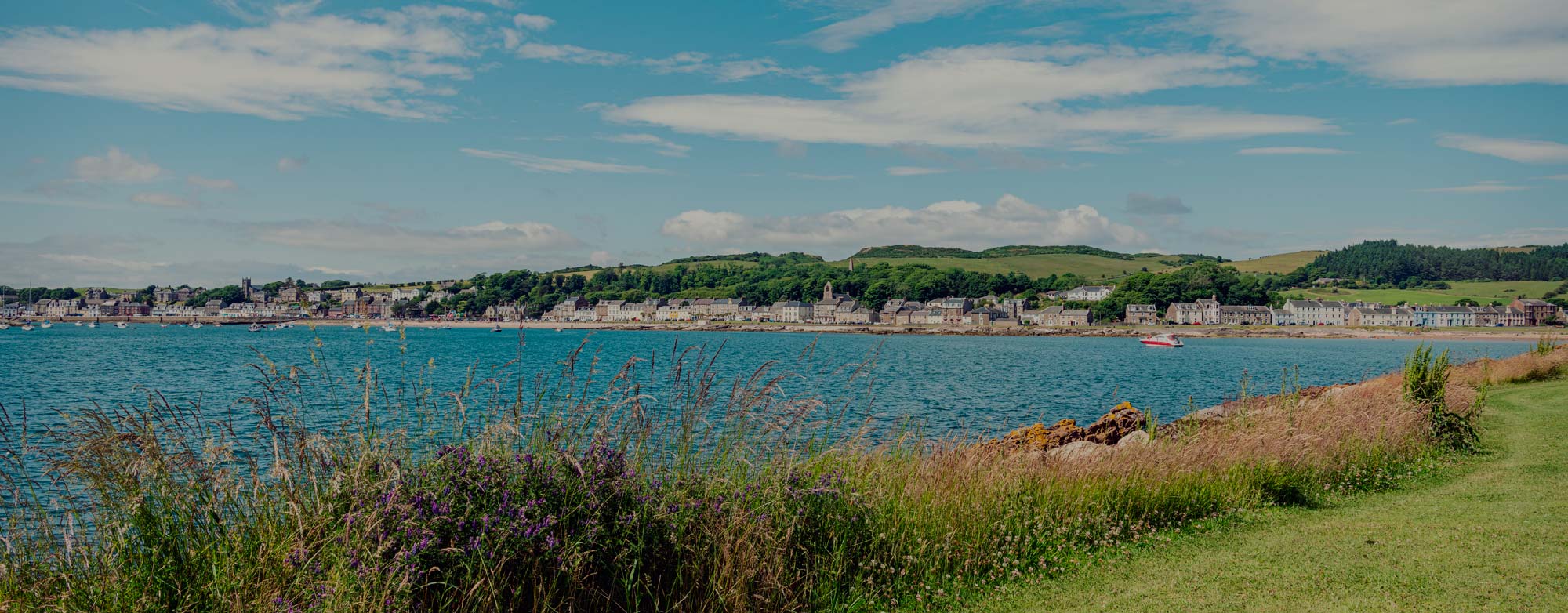
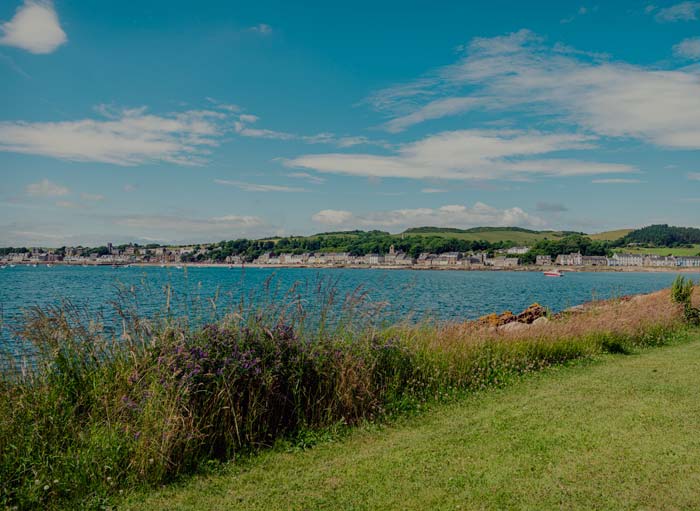


In a traditionally male oriented and dominated industry, more and more women are choosing a career in distillation, opting to establish their own Scottish Gin brand or set-up a business related to Scottish Gin or Scottish spirits. In Women of Gin, we speak with the female Scottish Gin makers and business owners who are changing perceptions and producing brilliant Scottish Gin, as well as other innovative, dynamic and creative women supporting the Scottish Gin and spirits sector.
In our latest Women of Gin feature we caught up with Bronwyn Jenkins-Deas from the team at Isle of Cumbrae Distillers, which saw new friendships form over their love of an island, gin and looking at how they could collectively support the renovation of the island town hall.
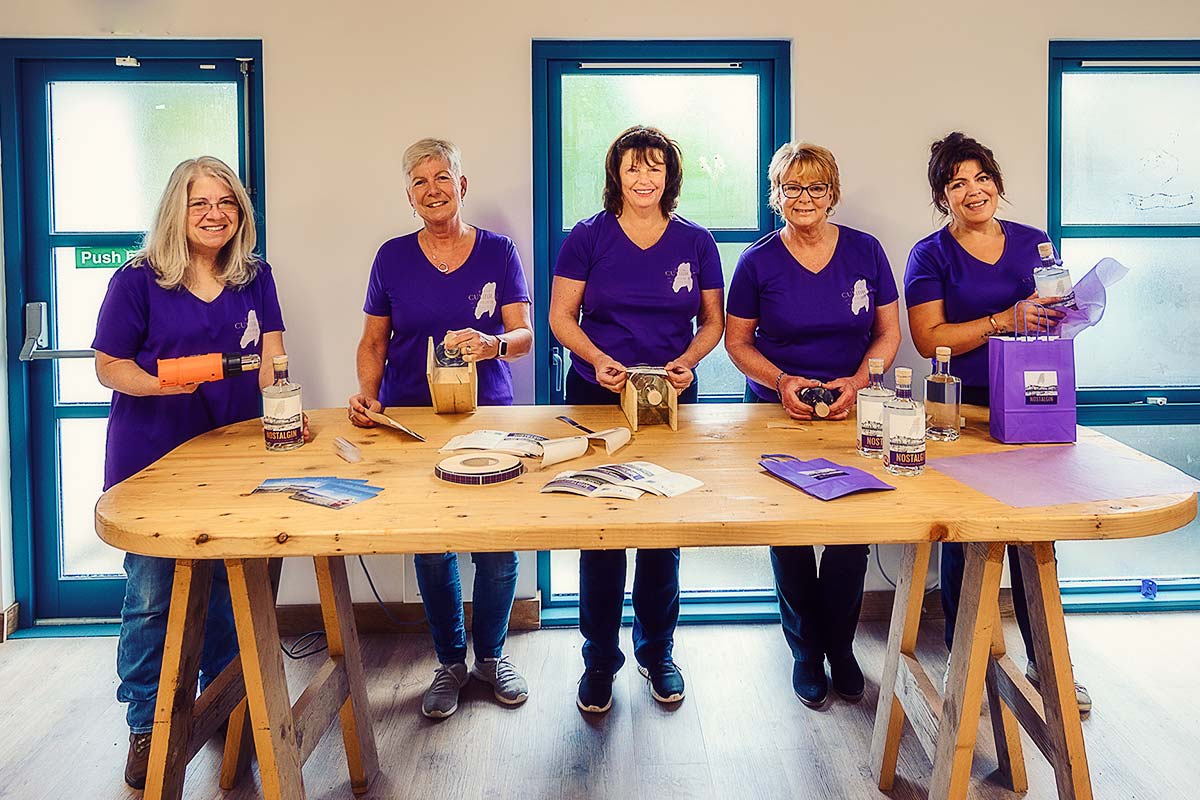 The co-founders of the Isle of Cumbrae Distillers from left to right: Juli Dempsey, Bronwyn Jenkins-Deas, Philippa Dalton, Lynda Gill, Jenine Ward. (Pic: Courtesy of Isle of Cumbrae Distillers)
The co-founders of the Isle of Cumbrae Distillers from left to right: Juli Dempsey, Bronwyn Jenkins-Deas, Philippa Dalton, Lynda Gill, Jenine Ward. (Pic: Courtesy of Isle of Cumbrae Distillers)
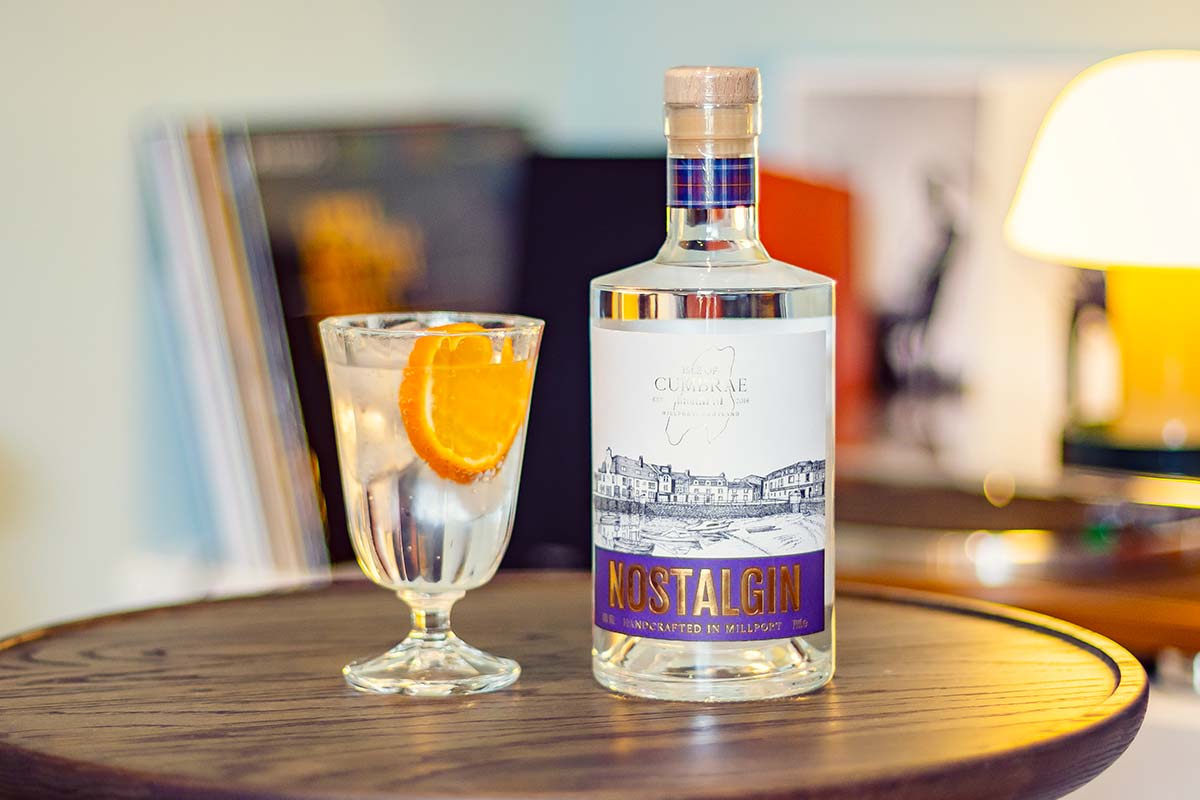 The signature Nostagin was the first release from the Isle of Cumbrae Distillers. (Pic: ©The Gin Cooperative)
The signature Nostagin was the first release from the Isle of Cumbrae Distillers. (Pic: ©The Gin Cooperative)
Who’s involved in the business and what are your different roles?
Bronwyn Jenkins-Deas, Jenine Ward, Juli Dempsey, Lynda Gill and Philippa Dalton are the five women who own and manage Isle of Cumbrae Distillers. In terms of different roles we’re all involved in all aspects of the business. For example, since none of us come from a drinks or distillation background, we’ve all been able to learn the distillation process together as a team, with two of us at any one time running the distillations. Other roles include the packaging and logistics, tours of the distillery, managing the marketing and branding and more.
What are your respective backgrounds and how did you get into the drinks industry?
We are an international team, three from the UK, one from Canada and one from the USA. We have decades of professional experience between us, in various industries. We actually met as strangers – in a Millport bar – 2 years ago, became fast friends and decided to open a gin distillery… of course! We initially came together to generate ideas to raise money to help rebuild the island’s town hall. The island had lost its community hub with the closure of the hall; it needed 3 million pounds in renovations. We decided that Millport needed a gin distillery. Several gin and tonics later, we decided we would be the ones to open the gin distillery.
So, not knowing much about gin, except that we liked to drink it, we established Isle of Cumbrae Distillers. While collectively we have decades of life and work experience between us, we knew nothing about the food and drinks industry. In this regard we started from scratch; none of us knew anything about distilling… or licensing (which we quickly learned meant 7 complex applications)! We also didn’t know that 6 months after we incorporated, the world would be paralysed by a pandemic.
In the end, we turned the threat of the pandemic into an opportunity to learn. And we have indeed learned… a lot!!! We ran a very successful crowdfund campaign early on and raised almost £22,000 and after the crowdfunding campaign, a donor came forward and bought our distilling equipment outright! From distilling to licensing to branding our products, to social media campaigns, we have done everything on our own… and loved every moment of the journey.
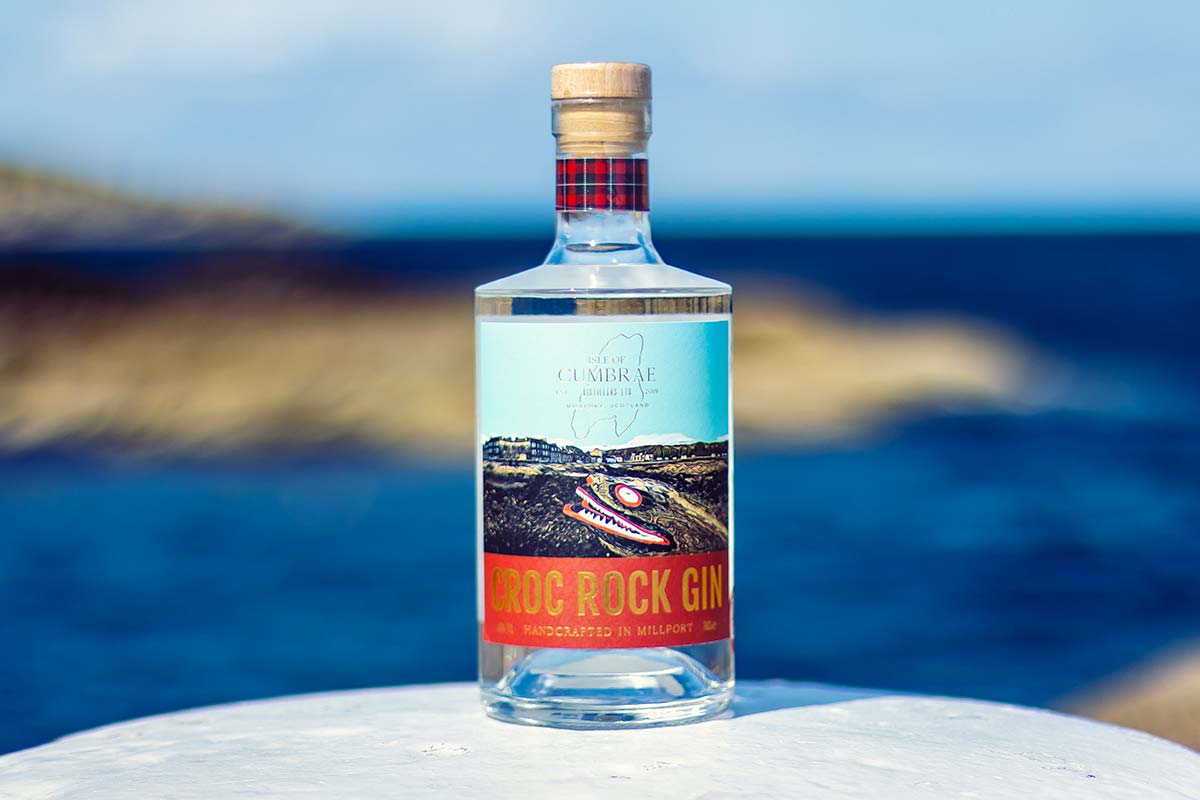 Croc Rock Gin was inspired by the local Millport landmark Croc Rock. (Pic: ©The Gin Cooperative)
Croc Rock Gin was inspired by the local Millport landmark Croc Rock. (Pic: ©The Gin Cooperative)
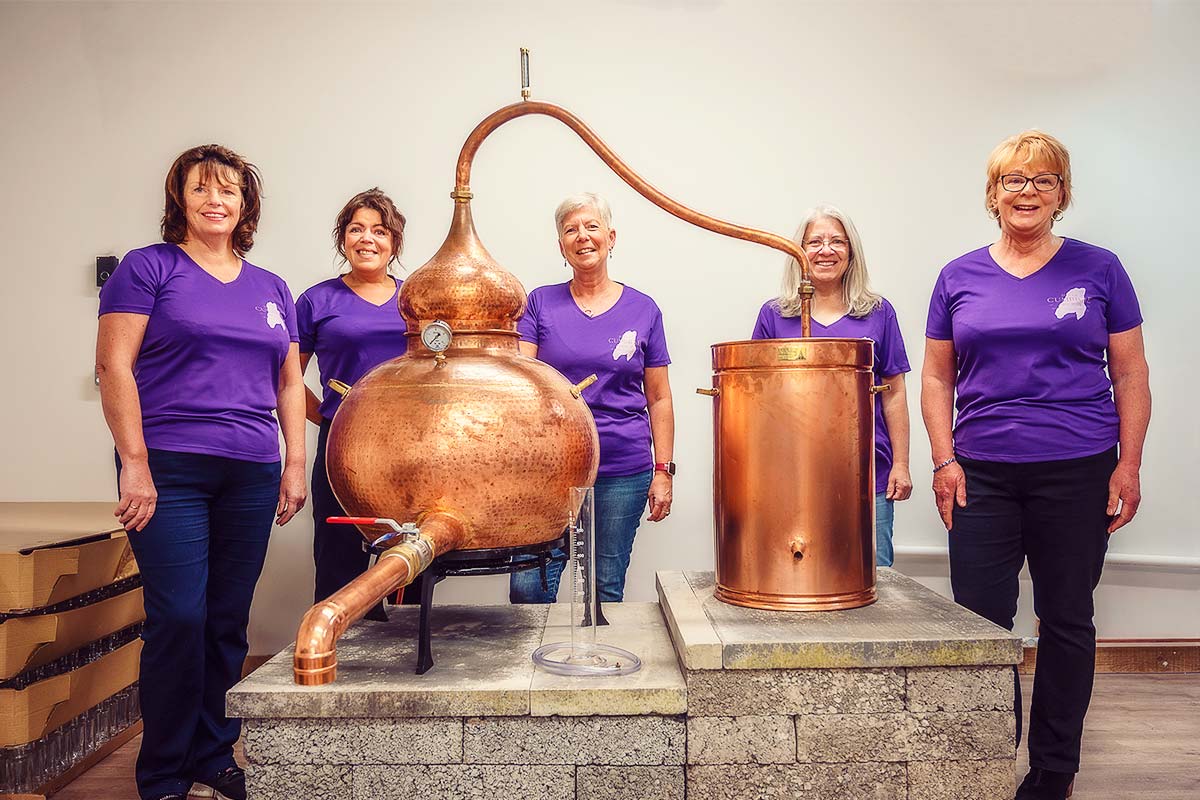 The team at the Isle of Cumbrae Distillery use traditional copper Alembic stills for the distillation along with a smaller still that’s used for recipe development. (Pic: Courtesy of Isle of Cumbrae Distillers)
The team at the Isle of Cumbrae Distillery use traditional copper Alembic stills for the distillation along with a smaller still that’s used for recipe development. (Pic: Courtesy of Isle of Cumbrae Distillers)
Is it your experience that women are treated differently to men in the industry?
That’s a particularly interesting question in our case and I would change this out a bit and ask not only are women treated differently but, as women of a certain age, are older women treated differently in the industry? I think, in our case, we have been treated very well. When we first set off on our journey, we heard that a distillery from a neighbouring island planned to launch in Millport. First thing we did was approach them to let them know that a group of islanders planned to launch the distillery. Instead of laughing at us they said “how can we help?” From labelling to bottling, they generously shared all their resources to help get us started. They even loaned us their distiller, who trained us over the year before we launched. They were amazing and we continue to look for ways to collaborate.
I think because we are older, people in the industry don’t see us as a threat and so everyone has been super helpful. To be honest with you, our being older is probably our best weapon!!! But seriously, to date, it’s actually been an advantage for us being women in the industry and our story, as older women, is unique. We feel we are treated equally in the industry and we have the added advantage of being able to be part of a very strong network of women’s business owners. In 2021, we won The Scottish Association of Business Women’s Newcomer of the Year award and N. Ayrshire Business Women’s Enterprise of the Year. We have these added opportunities by being women in business.
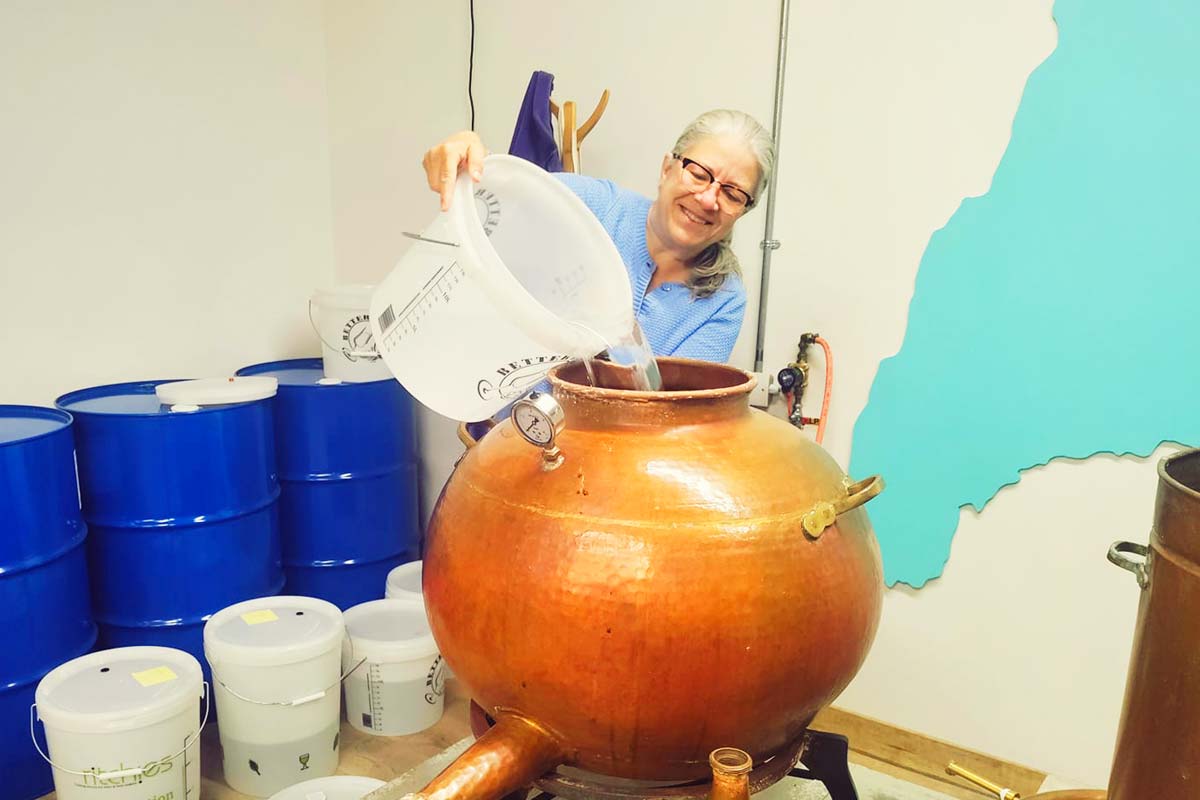 Isle of Cumbrae Distillers team have garnered a number of awards for their Scottish Gins since launching the business in November 2019. (Pic: Courtesy of Isle of Cumbrae Distillers)
Isle of Cumbrae Distillers team have garnered a number of awards for their Scottish Gins since launching the business in November 2019. (Pic: Courtesy of Isle of Cumbrae Distillers)
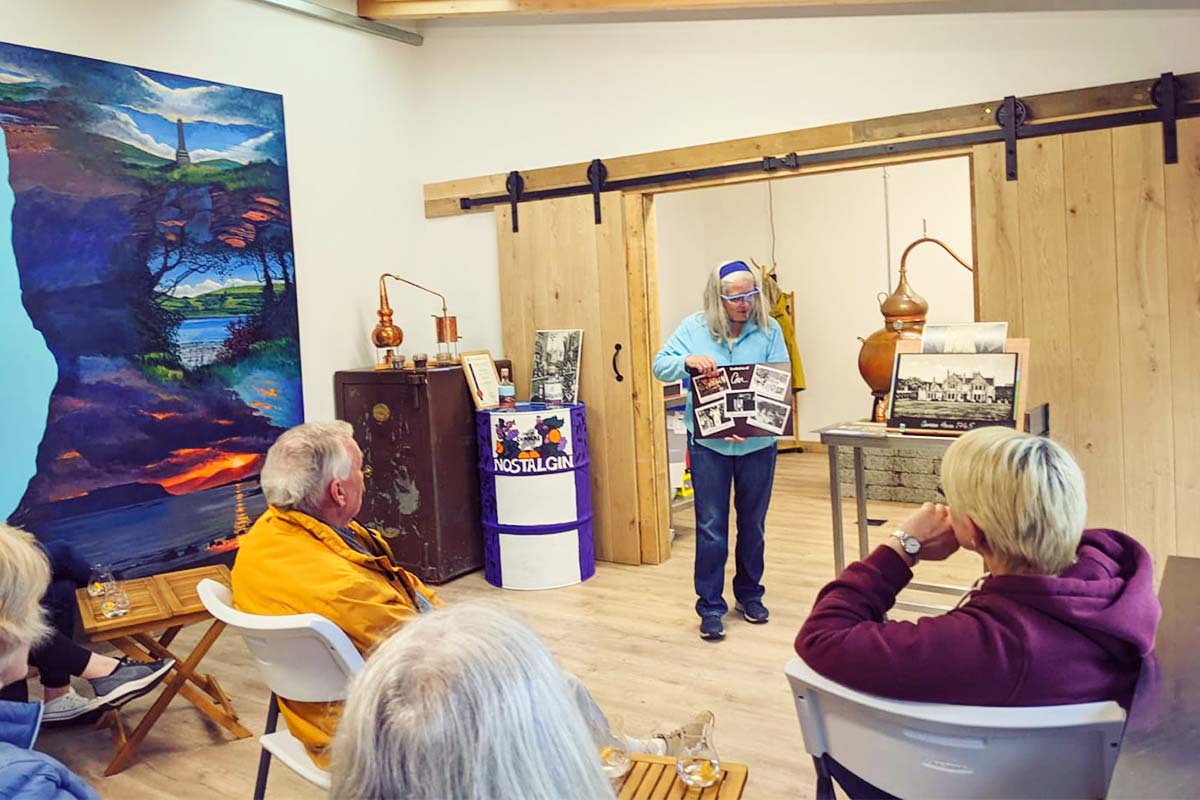 Visitors to the distillery can enjoy a tour and tasting experience. (Pic: Courtesy of Isle of Cumbrae Distillers)
Visitors to the distillery can enjoy a tour and tasting experience. (Pic: Courtesy of Isle of Cumbrae Distillers)
Do you think more could be done to encourage women to seek a career in drinks and spirits?
Yes. First, I think we need to properly define the scope of careers in the industry. I think many think that a career in drinks and spirits means low paying jobs. There are so many aspects of the industry and we need female leaders in the industry to be part of that education. Partnerships with the Education industry is paramount. That’s something we have tried to do in our business; create real projects for students so that they can experience our industry. We have also committed resources to funding internships for new graduates, giving them an opportunity for meaningful experiences in the industry. I wish there were more training opportunities in the distilling field. At the moment, there is really only one professional development opportunity in the UK for people who want to understand owning and operating a distillery. Herriot-Watt has a fabulous degree program but we need more at the certificate or diploma level.
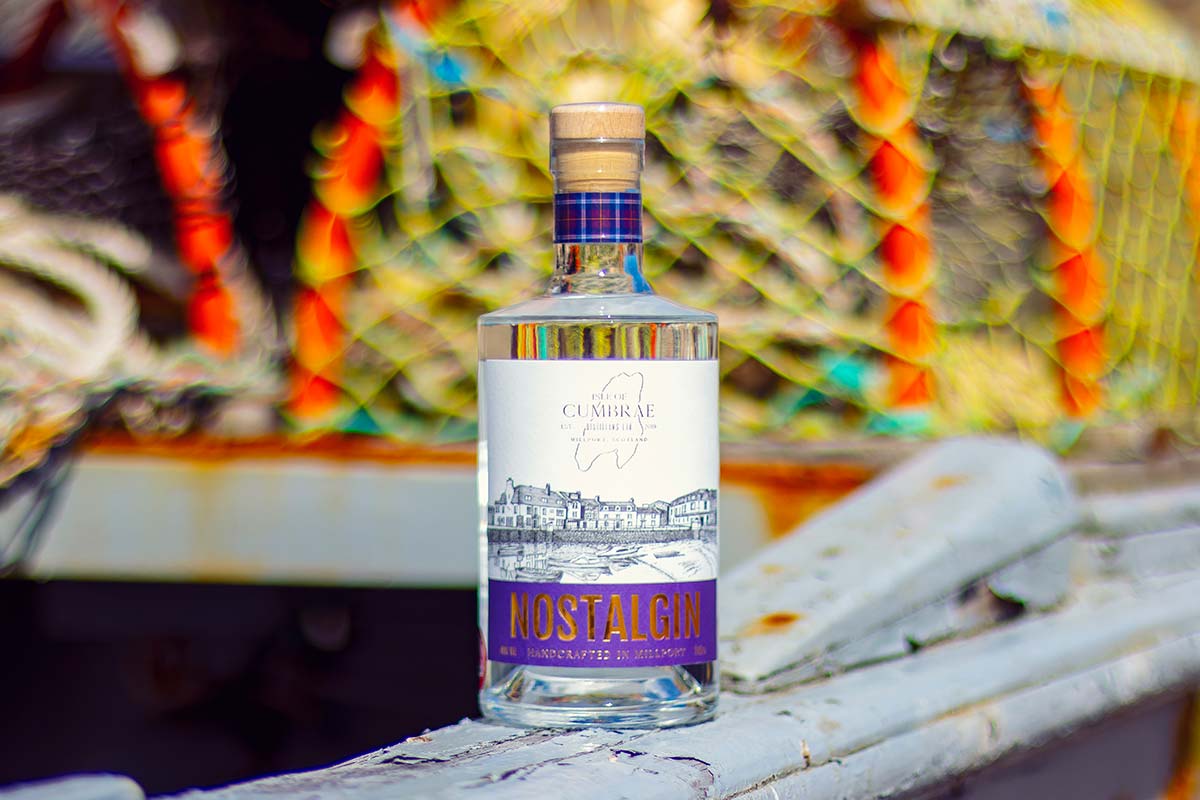 Nostalgin features artwork by local artist Jack Sutton. (Pic: ©The Gin Cooperative)
Nostalgin features artwork by local artist Jack Sutton. (Pic: ©The Gin Cooperative)
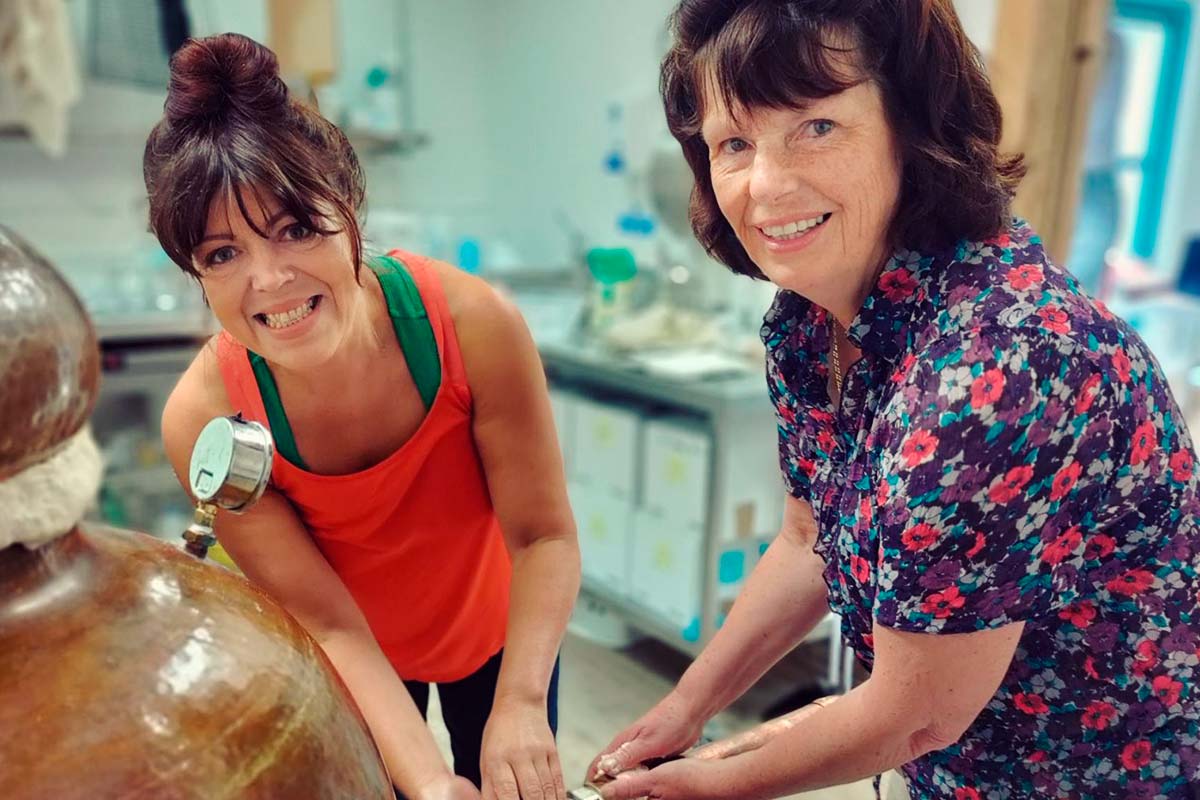 From left to right: Jenine Ward and Philippa Dalton getting set-up for a distillation. (Pic: Courtesy of Isle of Cumbrae Distillers)
From left to right: Jenine Ward and Philippa Dalton getting set-up for a distillation. (Pic: Courtesy of Isle of Cumbrae Distillers)
What’s been the biggest challenge you’ve had to overcome as a business?
Our first two years in business has been all about overcoming challenges, the biggest one being that we knew nothing about the drinks and spirits industry. Perseverance and patience are the keys to success. Keep the goal in sight and keep on plugging away. What you don’t know you can figure out. For every barrier we faced, we found solutions. For example, during Covid, Licensing boards were not meeting and we needed a Premises License to open. We persevered and worked with North Ayrshire Council to find a solution and launched the distillery with occasional licenses renewed every two weeks until Boards started to meet again.
During level 3 restrictions we were advised that we could open as an essential service (yes, gin is essential!); this meant that we were not eligible for the 2000 monthly funding. However, Tier 3 restrictions also meant that no visitors were allowed to the island so we had to close because we had no customers. When we did attempt to open in April with the launch of our new gin on April 1st, we were shut down immediately by our local police who determined we were not an essential service. Several letters to the higher-ups later, we were back in business. It was the police who had made the error. We have also had to work through Brexit issues and not been able to get supplies… like bottles for the gin on one occasion. And we continue to manage challenges with our building being totally covered by scaffolding and the challenge of people actually finding our shop. We have certainly learned firsthand about resilience and patience during an incredibly difficult situation.
What’s the best piece of advice you could give to women who are starting off their career in spirits and distillation?
Spend time gathering information about the industry. Understand how Scottish gin differentiates itself. Whatever role you play in the industry you will have a marketing role – you represent Scotland – so you have to understand and be able to communicate the value of Scottish gin. Deep dive into the distilleries themselves. Understanding the industry is not only about understanding the product; it’s about understanding the distillers and their stories and how they represent Scottish gin. If you can’t find paid opportunities because you need experience, look for volunteer opportunities to understand the industry better. Employers value volunteer experiences because it shows you are serious and are willing to invest in your future career.
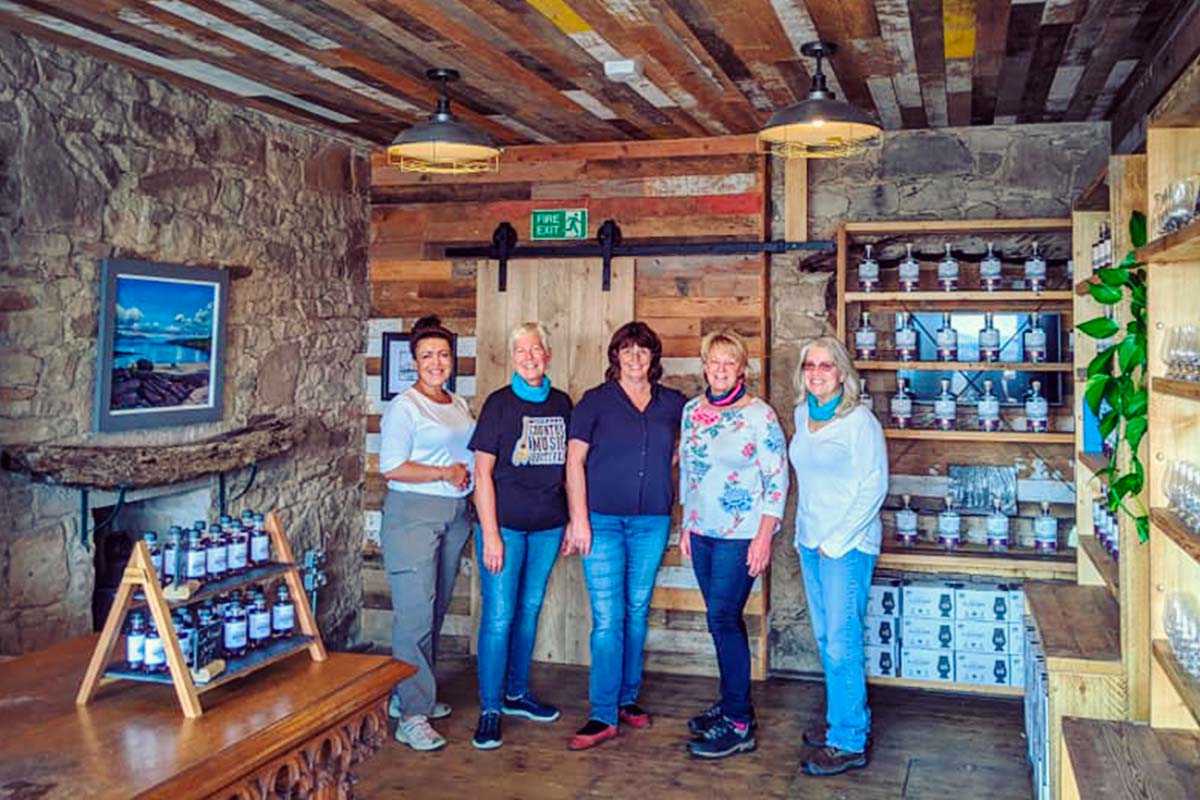 The Isle of Cumbrae Distillers do everything by hand including distillation, bottling and labelling at the distillery. (Pic: Courtesy of Isle of Cumbrae Distillers)
The Isle of Cumbrae Distillers do everything by hand including distillation, bottling and labelling at the distillery. (Pic: Courtesy of Isle of Cumbrae Distillers)
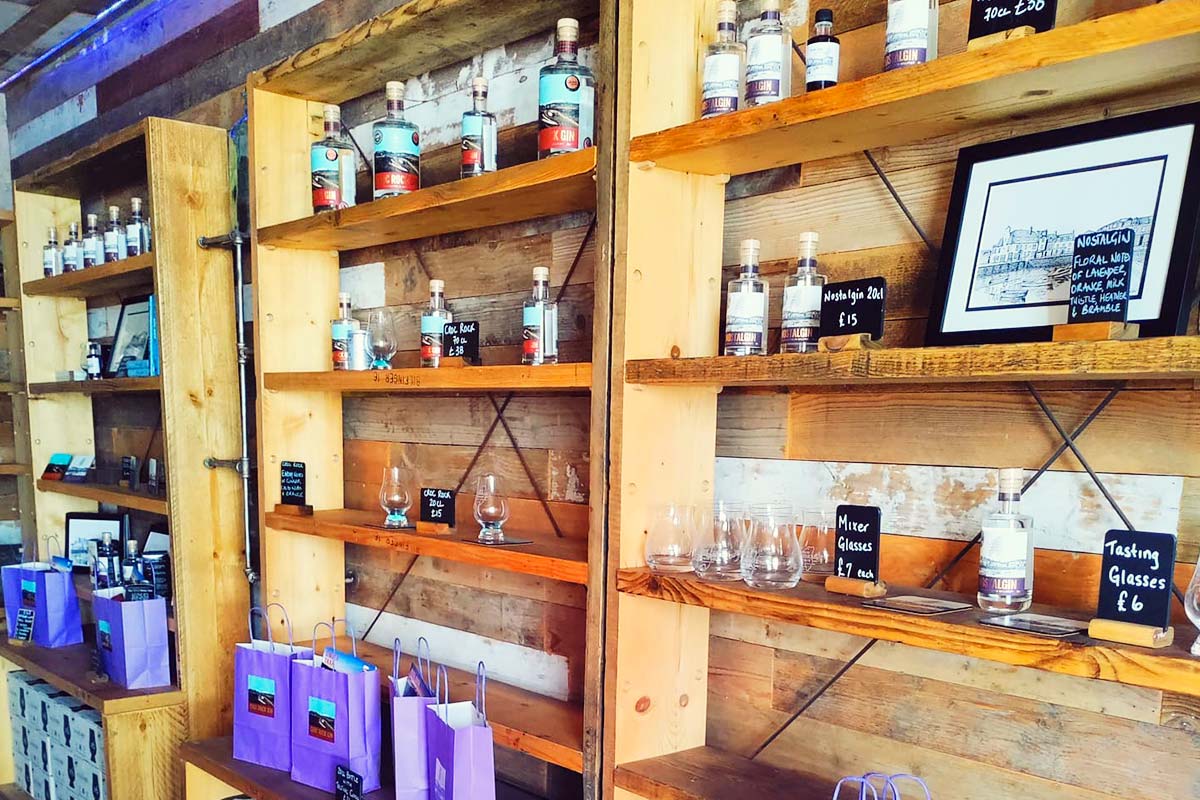 The distillery in Millport stocks the full range of Scottish Gins along with a range of gifts from local artists and businesses. (Pic: Courtesy of Isle of Cumbrae Distillers)
The distillery in Millport stocks the full range of Scottish Gins along with a range of gifts from local artists and businesses. (Pic: Courtesy of Isle of Cumbrae Distillers)
What does the term Scottish Gin mean to you?
Undeniably, we share the exceptional quality of pure Scottish water – there’s nothing like it to create a superior craft gin – but more importantly Scottish distilleries showcase and celebrate the resilience and fortitude of the diverse communities that make up Scotland. Scottish gin is inclusive; it has embraced our band of merry women and has welcomed our international team as part of the Scottish gin community.
What do you think are the big issues facing Scottish Gin at the moment?
Too much of it. Right now we have over 500 different gins. How can we expect brand loyalty when there is so much great gin out there? There’s pressure on the distilleries to come up with new products, there’s pressure on the consumer to try new brands and the retailers don’t know which way is up. It’s been a huge challenge for us convincing stockists to take us on as a relatively new brand. How do we differentiate ourselves in the market? Thank goodness we are the only group of older women out there… to date!
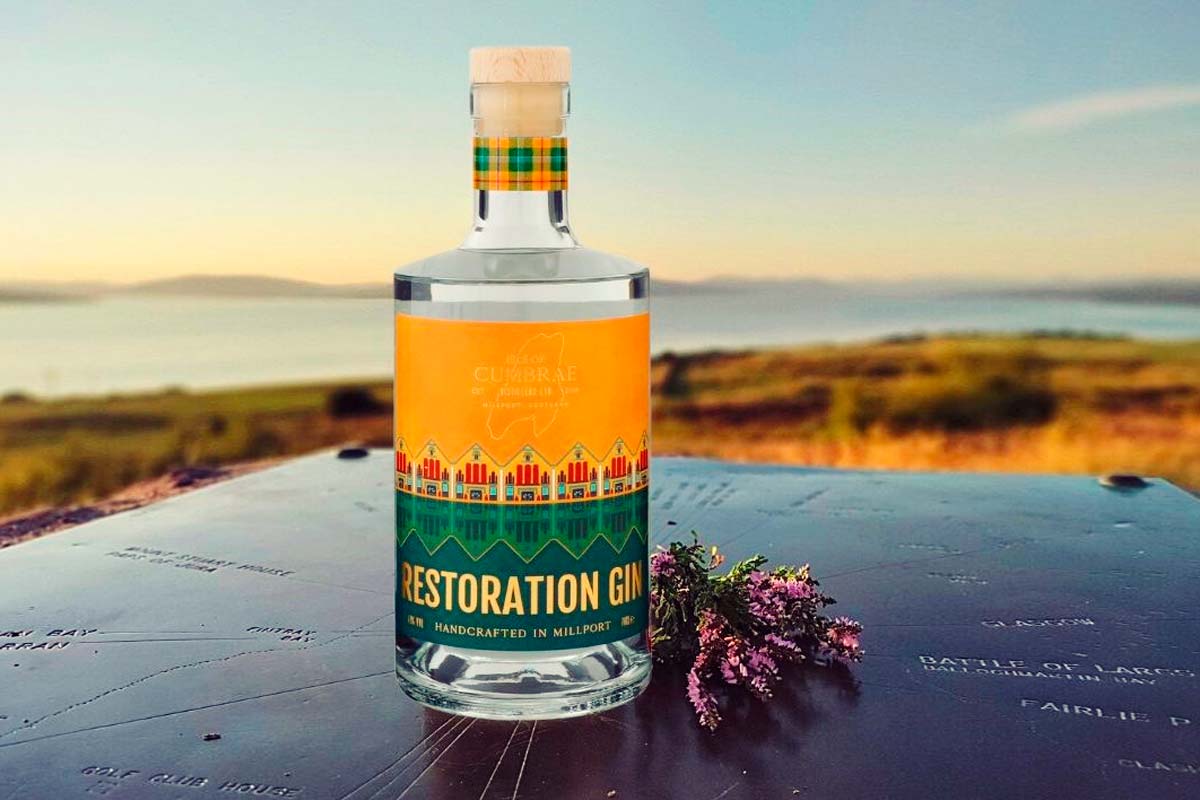 Restoration Gin is the third Scottish Gin expression from the distillery, with a percentage of funds donated towards the renovation of the local town hall. (Pic: Courtesy of Isle of Cumbrae Distillers)
Restoration Gin is the third Scottish Gin expression from the distillery, with a percentage of funds donated towards the renovation of the local town hall. (Pic: Courtesy of Isle of Cumbrae Distillers)
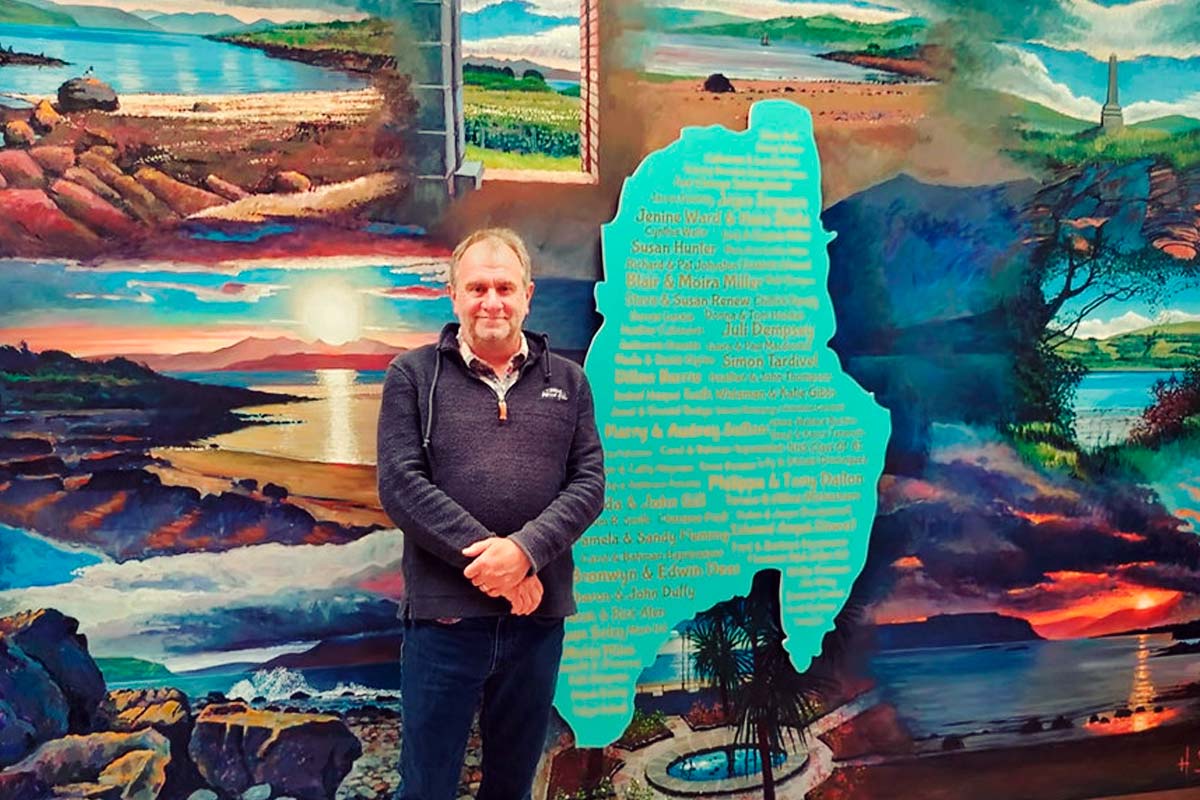 The distillery and shop features a mural by local artist Harry Sutton. (Pic: Courtesy of Isle of Cumbrae Distillers)
The distillery and shop features a mural by local artist Harry Sutton. (Pic: Courtesy of Isle of Cumbrae Distillers)
What other female distillers and distilleries do you admire?
Of course, we really admire Lesley Gracie, Master Distiller at Hendrick’s Gin. I would love to see her do a bit of mentoring for women in the industry. We also follow Lussa Gin and think they are doing a great job. And we are super impressed that they have been able to get their gin to the US. That’s certainly a future goal for us.
Where do you see Isle of Cumbrae Distillers and Scottish Gin as a category in 10 years time?
Over the next 5 years we hope to expand and have a larger facility and more equipment. Right now we only have a 100-litre still. We also anticipate selling our gin overseas and we are already putting in the strategy to do that successfully. In terms of gin as a category, I think it will remain popular. Brands will come and go. I think there will be growth in the US, in particular, which will be great for Scottish gin.
You can learn more about Isle of Cumbrae Distillers here.
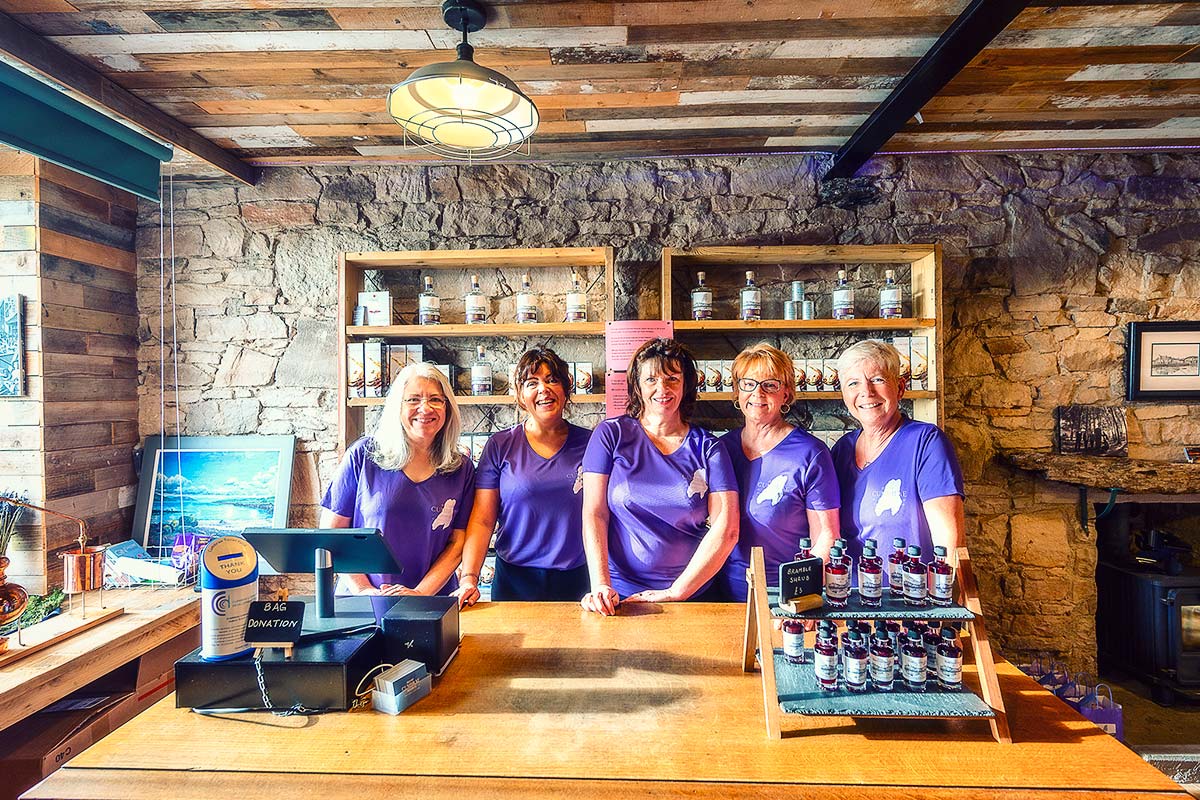
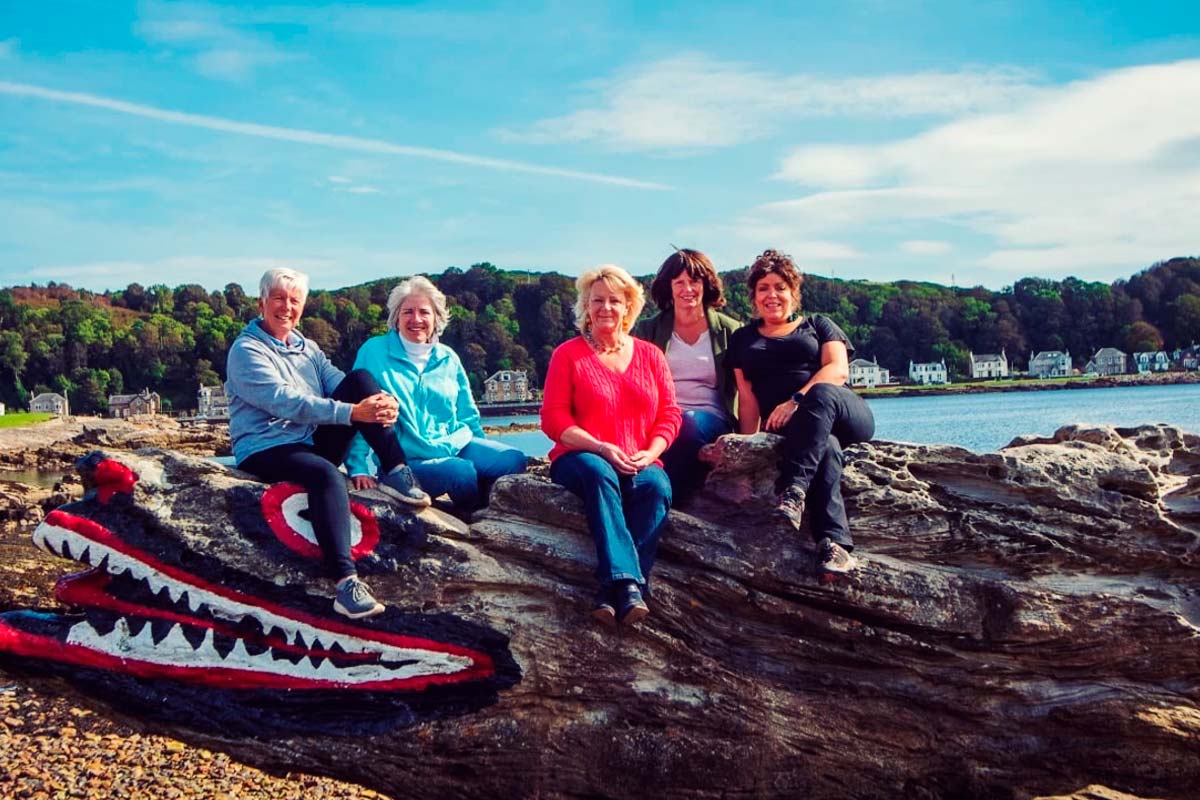
You can learn more about Isle of Cumbrae Distillers by visiting the links below.